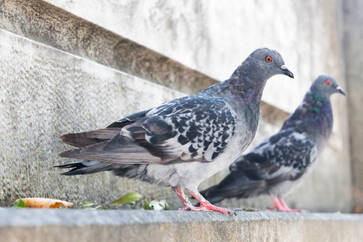|
While some people love to spend time with pigeons on sidewalks or parks, and feed them seeds or breadcrumbs, others view them as pests that can carry dangerous diseases. They can transmit diseases to humans, regardless of whether you love or loathe pigeons. One of these diseases is Psittacosis. Although it is possible to get infected by pigeons, it is not uncommon to be around them. However, certain conditions can increase the risk of getting infected. It is important to understand the signs and how pigeons spread it. What is Psittacosis?
Psittacosis refers to a respiratory disease that humans get from a type of bacteria (Chlamydia pisittaci) that birds shed. The disease is sometimes called ornithosis or parrot fever and can affect many species of birds. Birds infected can either become very sick or not show any symptoms, making it difficult for people to determine if they are at risk. The disease can be passed to humans and other mammals, regardless of whether the birds show symptoms. Both with and without symptoms, infected birds shed bacteria in their respiratory secretions and droplets. These secretions and droppings become dust when they dry and spread through the air. This dust can then be inhaled by humans. Psittacosis is spread by inhaling dried dust particles. It can also be spread by bites and beak-to mouth contact. Psittacosis can be contracted by anyone of any age but is most prevalent in bird owners and people who work in bird-related occupations. Additional points of infection can be found in pigeons with psittacosis. This illness spreads quickly among birds and thrives where there is excess space, such as nests and roosting areas. It is possible that large flock outbreaks of pigeons will occur. Psittacosis Symptoms Psittacosis symptoms can often be compared to the flu symptoms. However, severe symptoms may include pneumonia. You should seek medical attention if you suspect that you have psittacosis. Antibiotic treatment is necessary. These symptoms may be: * Dry cough * Fever * Chills * Headache * Muscle pain * Nausea/vomiting * Sore throat * In severe cases, difficulty breathing * In severe cases, chest pain * In severe cases, pneumonia * In severe cases, nosebleeds * In severe cases, swelling of the organs Treatment Since 50 to 200 cases of Psittacosis are reported each year, it is considered rare among humans. Many researchers believe the illness is not well-reported. The symptoms are similar to common diseases like the flu, and it often goes unnoticed. For severe cases of psittacosis, medical treatment is required. Psittacosis patients should be treated with antibiotics (typically tetracycline and doxycycline). How Pigeons Spread Psittacosis Although psittacosis is also known as "parrot disease", any bird that is susceptible to the bacteria could spread it. Because pigeons are often found in large groups, the possibility of spreading the disease to other pigeons is high. Red, watery eyes and nausea can all be signs of illness. They may not show any symptoms. The possibility exists that pigeons may have genetic resistance, which makes them less likely to display symptoms, and consequently become carriers. Pigeons can roost in large numbers and leave piles behind. These areas can be a potential source of infection for humans. You can then focus on the maintenance tasks that reduce the risk of pigeons spreading psittacosis. Psittacosis Dangers to Commercial building owners Both urban and rural pigeons are common. They can infest your commercial property by roosting on your eves, your railings, and even your steps. Pigeons can leave piles of droppings wherever they flock, so if they are roosting in your building, you might find them dumping their droppings everywhere they go. Now that you know more about how pigeons spread the disease, it's time to start sweeping up dried droppings from your breezeways and steps. Your employees and patrons are at risk if pigeons spend their evenings and nights on your premises. It's almost impossible to eliminate exposure from psittacosis if you have a pigeon problem. Deterrence is the key. Deterrence is the key. Psittacosis for Commercial Settings Groups of pigeons sitting on a rail of a commercial property are more likely to attract flocking birds than homes. You're familiar with the places where pigeons leave piles and the damage they can do. You know that bird droppings can cause serious health problems, and you are a business owner. Droppings from pigeons can endanger customers and employees as well as their health. You can also be at risk if pigeons enter your commercial building. You, as a business owner have the responsibility of maintaining a clean environment. There are risks when you clean up bird droppings. OSHA recommends taking precautions in order to prevent workers from getting the disease by inhalation. Deterrence is a good way to avoid the potential problems caused by pigeons in commercial areas. Other measures may be needed, even though visual and audio deterrents can be effective in commercial settings. Optical gel and Bird spikes are both effective in deterring pigeons from commercial spaces. Learn more about how pigeons spread the disease and the dangers posed by their droppings. This will help you to understand the symptoms and prevent infection. It is important to deter pigeons safely and humanely. This will help you avoid the dangers they pose and minimize the damage they do to your home and business. Get in touch with our commercial bird specialists to learn more about psittacosis or other diseases that can spread through pigeon droppings. Comments are closed.
|
Archives
February 2023
Categories |


